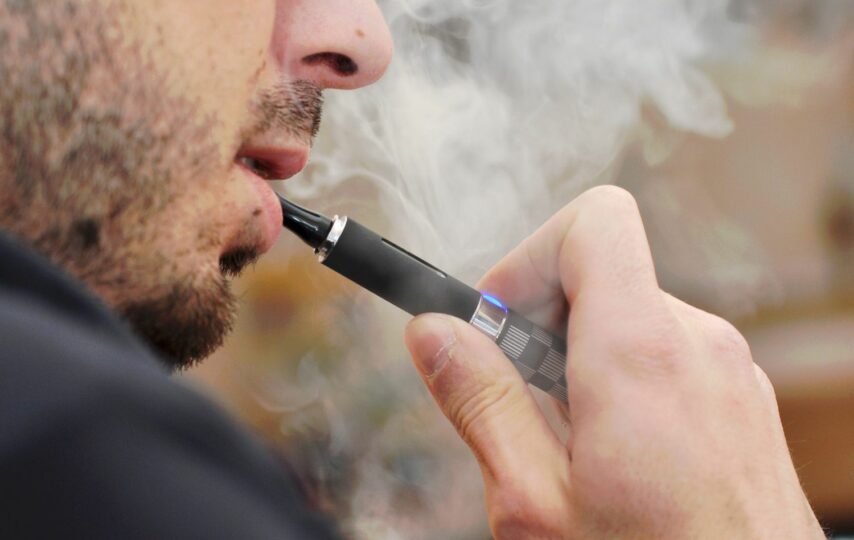As Americans continue to shy away from cigarettes and tobacco in general, the vaping market increases. In 2022, about 11 percent of American adults still smoked cigarettes, while 8 percent regularly used a vape. This represented a 2% rise on 2019’s figures and the poll showed a consistent drop in smoking and an increase in vaping.
Over time, the tobacco industry has experienced many changes. Cigarette manufacturers have seen advertising restrictions, the introduction of warnings on packets, and a shift in consumerism toward reduced-risk products such as vapes.
As health concerns drive smokers toward quitting, the vaping industry has grown, and the next few years will see more change.
How big is the e-cigarette and vaping market now?
Last year, the global vape market’s value was $22.45 billion and it is expected to grow at an impressive rate. Predictions are that the world’s e-cigarette and vape industry will grow at a CAGR of 30.6% until 2030.
The causes for this huge growth are partly due to better health education surrounding the dangers of smoking cigarettes. But, it is also the advancing technology behind vape pens and other improvements that are leading smokers toward vape pens.
What is the outlook for the vaping industry?
With the boom in ecommerce in recent years, partly brought on by the pandemic, there could be growth in online vendors for vape products. Already vaping products can be viewed on offshore sites such as Dampfi.ch E-Zigaretten. Online vaping stores allow consumers anywhere in the world to compare and purchase products as long as they meet age restrictions.
But, there are many other elements that will affect how the vaping industry changes. And the tobacco industry will also play a part here.
Smoking bans becoming stricter
Vaping doesn’t have the same social stigma that smoking has, and vape pens are more accepted than cigarettes today. As smoking bans become stricter, more people will either quit cigarettes or move to vapes.
The loss to the tobacco industry could be a gain for vape manufacturers. Of course, cigarette makers aren’t going to lay down, and one emerging trend to vaping will see more tobacco companies involved with vape manufacturing.
Vaping products becoming cheaper
In January 2019, the Vype ePod was launched for $40. By November of that year, the vape pen was just $10 including tax.
As the vaping market has grown and the technology behind the products advanced, the prices for vape pens have dropped. In some countries vaping is more expensive than smoking, but not in the US or UK.
Sales of vapes are expected to touch a new level this coming year, and this will be partly due to affordability.
One thing that may challenge these price drops is tax increases. If governments start to target vapes as they did with cigarettes, there could be tax hikes on vaping products.
Technological advances will make vaping simpler
The emergence of squonk mods has led to refillable vapes being far easier to set up, and far less messy, and other advances are being made to simplify vaping, make it safer, and even better for the environment.
More control over wattage and temperature
Regulated vapes let the user control the voltage and temperature of their vape. Changing the wattage allows the user to control how much vapor is produced, and how it tastes.
But, much more important is the health benefits of being able to adjust the temperature on a vape. Being able to set a low temperature on a vape pen means that the vapor being released is far safer than cigarette smoke as no carcinogens are produced.
Recycling one-use vape pens will improve
There are already legal obligations that vape manufacturers must meet in the UK and some other countries. Up to now, recycling for vaping products has been lacking, but it is likely that shortly, there will be far more options for recycling vaping-related products.
Recycling and safety of lithium batteries
Two other concerns with vaping are being addressed now too. In the past, the media has enjoyed publishing stories about exploding e-cigarettes. These incidents were extremely rare, but regardless, the industry has now added extra safety features to vapes to ensure this never happens again.
The other concern with lithium batteries is over recycling. Lithium batteries leach chemicals into the ground as the metal casing takes decades to decay. However, lithium batteries are being reused on an increasingly larger scale. And according to the EPA lithium batteries can be completely recycled.
Summary
While emerging markets continue to attract tobacco companies, these same manufacturers are likely to head further into the e-cigarette industry as smoking bans hamper sales.
The vaping sector will concentrate on producing smaller and more powerful devices that are simple and mess-free to use while working toward more environmentally-friendly products.
It is understood that vaping carries far fewer risks to human health, but recycling programs will need to step up to avoid vapes contributing to plastic pollution. And, likely, this is just what you will see.







